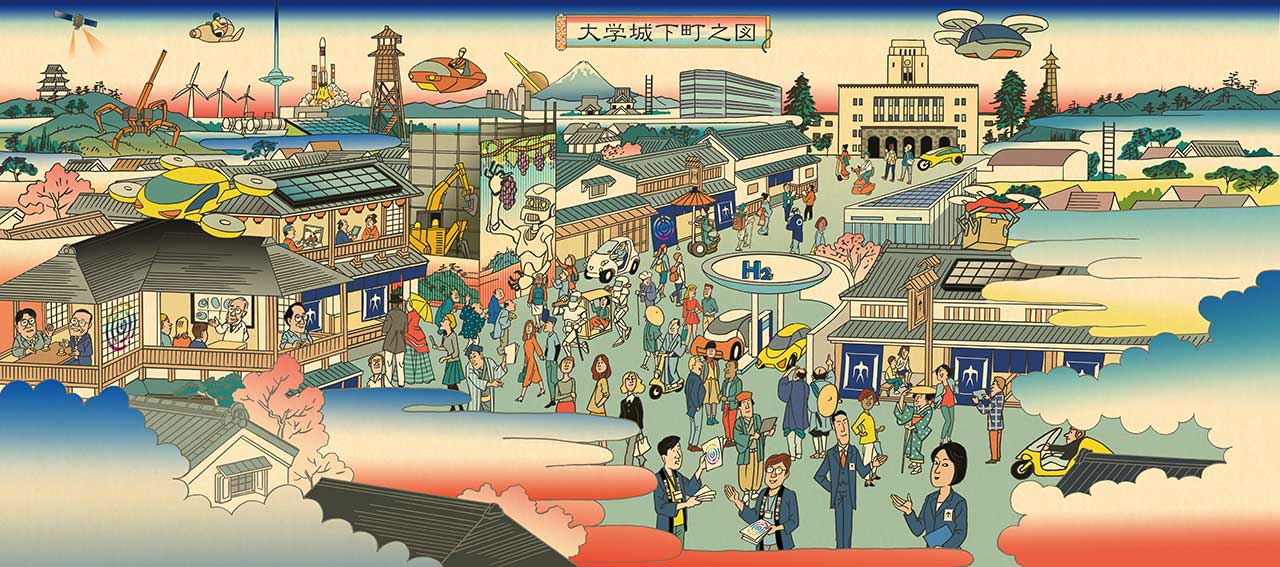
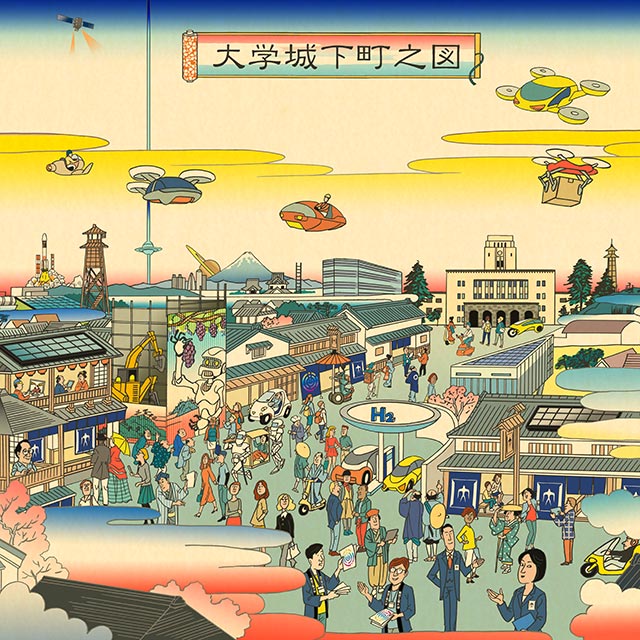
To create high-impact research and competitive businesses, it is no longer enough for universities and companies to solely deepen expertise they already possess. Tokyo Tech established the Open Innovation (OI) Platform to meet the needs of today through a new approach to industry-academic collaboration. Tokyo Tech and its industry partners are collaborating on exploration, going beyond the conventional approach of deepening of knowledge. The goal is to realize a "university town*" that will spread innovation throughout society.
to meet the needs of today through a new approach to industry-academic collaboration. Tokyo Tech and its industry partners are collaborating on exploration, going beyond the conventional approach of deepening of knowledge. The goal is to realize a "university town*" that will spread innovation throughout society.
- *
-
In this article, "university town" is used as a translation of the coined term daigaku jokamachi . Based on the Japanese word for "castle town," it is a metaphor for how companies of various domains and sizes gather around Tokyo Tech to innovate and create new business opportunities.
2nd Tokyo Tech International Open Innovation Symposium 2021 (February 8, 2021)
Instead of aiming for separate goals,
we will produce genuine value and mutually grow
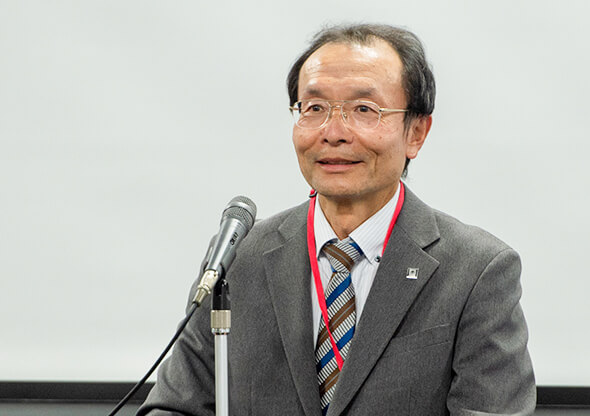
Osamu Watanabe, Director of the OI Platform, Tokyo Tech
As described by OI Platform Director Osamu Watanabe, Tokyo Tech and its partners are taking a new approach to industry-academia collaboration, committed to the development of new technologies and the creation of new businesses based on organization-to-organization agreements. The OI Platform allows for the implementation of a centralized management system with skilled professionals, investment in resources for Tokyo Tech research, and development of new businesses with companies that establish a collaborative research cluster at the university, supporting the path from technology discovery to adoption.
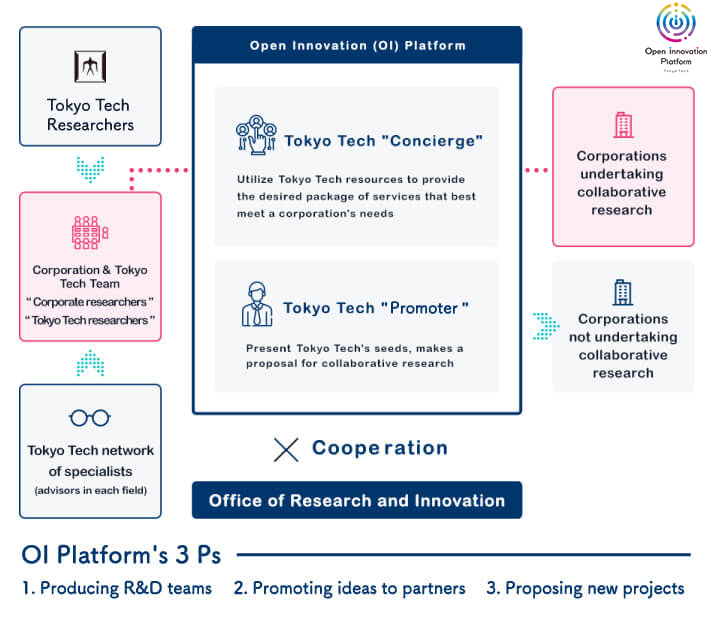
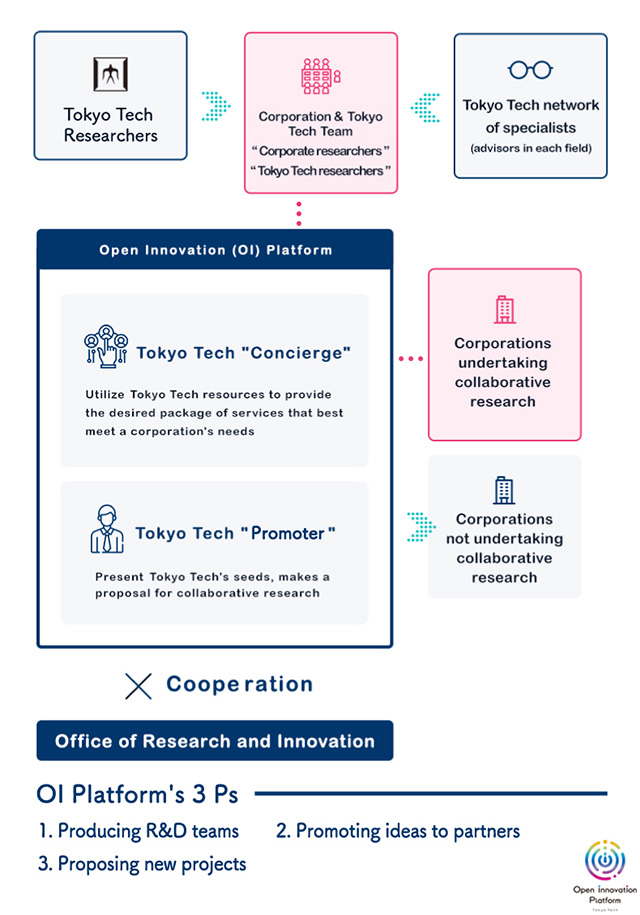
Conceptual overview of the OI Platform. Red dotted lines denote services that are already in place. Blue arrows denote services that the OI Platform will introduce upon request.
But Yoichi Oshima, who spearheads the OI Platform as its Associate Director and General Creative Manager, does not consider business development as the goal. By utilizing the creativity that diversity can produce, he is involving companies of various domains and sizes with the aim of sparking innovation that will advance society. As universities excel at innovative creativity, they will take the lead in transforming our society. At this forefront, Tokyo Tech is providing a platform that goes beyond "deepening of knowledge" to promote exploration. The aim is to build an ecosystem for social implementation.
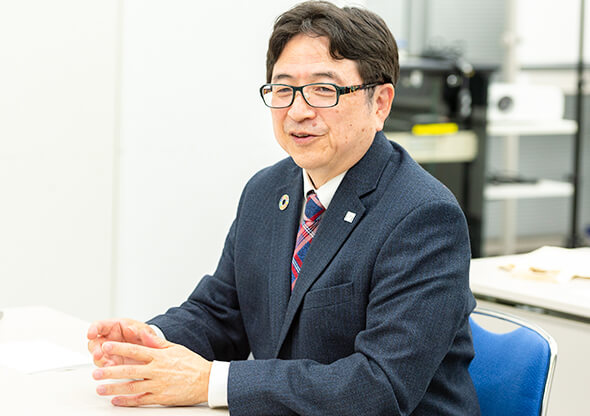
Yoichi Oshima,
Associate Director and General Creative Manager (CM)
of the OI Platform, Tokyo Tech
Industry-academia collaboration has often functioned by companies borrowing technical knowledge from individual researchers. But major structural changes are taking place in all industries that cannot be addressed with this conventional approach.
Automobiles, information processing, electronics, machinery, materials, biology. All industrial fields have an increasing need for technological development and business creation that transcends the framework of industry. For example, the auto industry (a key industry of Japan) is experiencing major changes in terms of both technology and business, such as the "electrification" of power sources, "automation" of driving, and "servitization" of business models. You can no longer maintain your business's competitive edge by solely enhancing your mechanical technology. Exploration aggregates and fuses various knowledge, including information processing such as artificial intelligence (AI), semiconductors, power electronics, technology, the relationship between things and people, and ethics. Technological innovation and business creation based on exploration have become essential.
To produce innovation that maintains global competitiveness in both the automotive and other industries, the expertise of companies and universities is required. In addition, it is necessary to go beyond the conventional frameworks, organizations, and barriers and involve more people in the creation of new value and take on social reforms, such as creating a business-friendly environment. Being well suited for exploration, Tokyo Tech will play a central role in realizing a "university town," serving as a place for companies seeking technological innovation.
The existence of a university town is also important for adding value to a university's own research. There are many global examples of university towns where a university and industrial cluster are paired, such as Silicon Valley around Stanford University. Furthermore, the challenges and visions of a dynamic industry are the sources of outstanding research achievements by universities.
There are challenges that can only be solved by Tokyo Tech
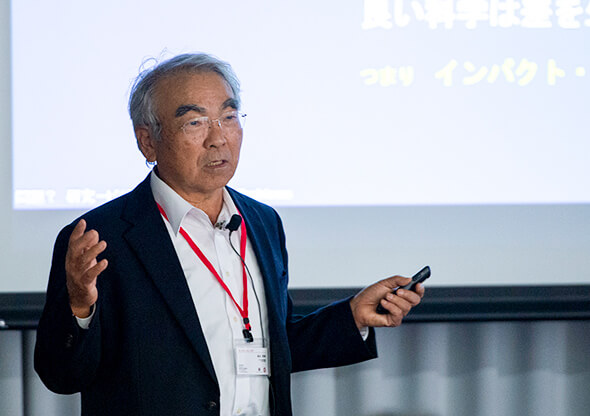
Professor Takeo Kanade, Carnegie Mellon University
It has been one and a half years since the first collaborative research cluster was opened under the management of the OI Platform. Then, on November 17, 2020, Tokyo Tech held the 1st Meetup of the Tokyo Institute of Technology Collaborative Research Clusters and the 3rd Tokyo Tech OI School.
In the keynote speech "Encouragement for Researchers" at the OI School, Professor Takeo Kanade of Carnegie Mellon University (an adviser to the Tokyo Tech OI Platform) shared the following message. "Good research is about setting and solving problems that have an impact on the world. In other words, solvable problems that are useful to solve. If you can set such a sophisticated problem, the research will be successful." University researchers have often focused on deepening of knowledge, and that will remain important. But there is larger growth potential for exploration. Tokyo Tech is seeking to accelerate exploration by providing a platform that brings in researchers from industry and outside experts, so Tokyo Tech researchers will encounter problems worth solving.
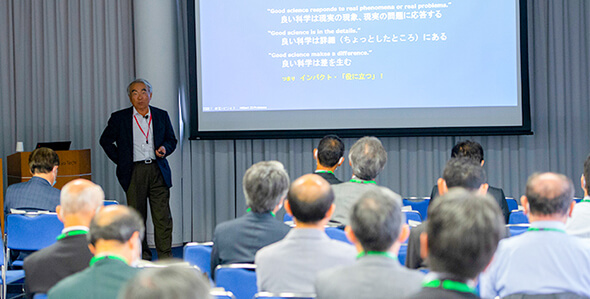
The OI School
The number of companies with collaborative research clusters at Tokyo Tech has doubled from three in 2019 to six in 2020. Members of the six companies at the Meetup and OI School expressed their opinions about changes in Japan's business environment, challenges they face, and the type of industry-academia collaboration they expect from Tokyo Tech.
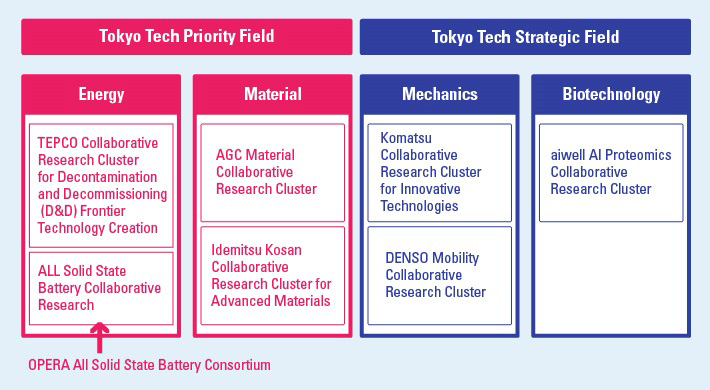
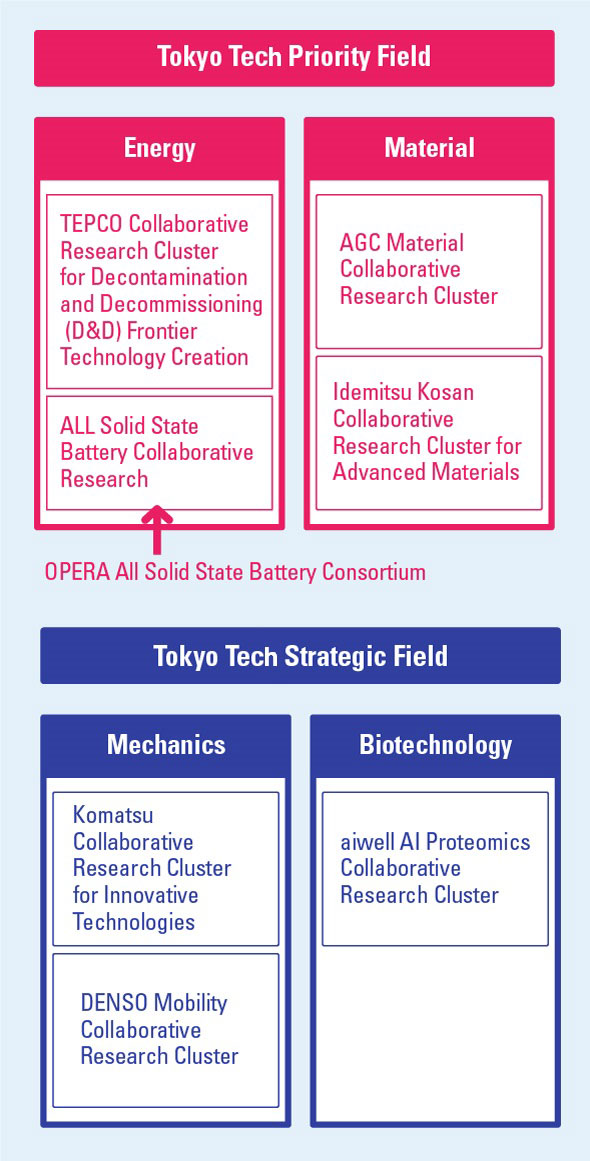
Collaborative research clusters managed by the OI Platform
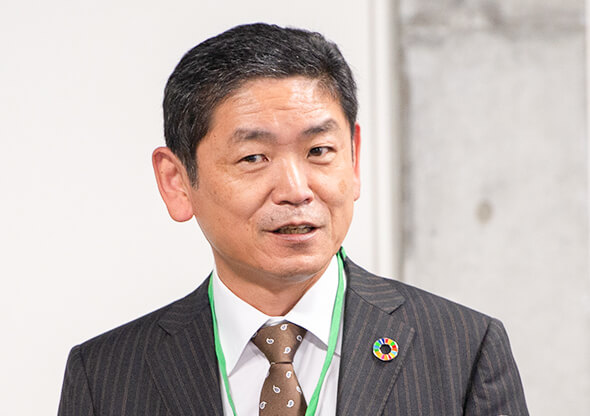
Keiji Mitsuyuki, DENSO
Japanese companies do not have high worker mobility compared to foreign companies. That means that even if the market and technological development trends change significantly, Japanese companies are not inclined to create innovation that involves development reforms. The expectations of Japanese industry for universities in this regard are now higher than ever. Keiji Mitsuyuki, Director of the Tokyo Office DENSO CORPORATION, which established the DENSO Mobility Collaborative Research Cluster, said "we must acquire new technology that responds to the major changes in the automobile industry. At the collaborative research cluster established at Tokyo Tech, we will work on multifaceted research and its social implementation with researchers from a wide range of fields such as electronics, semiconductors, electrical equipment, machinery, and communications."
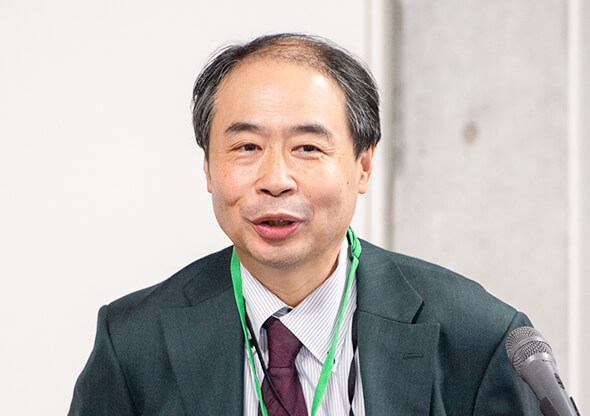
Iwao Akiba, Idemitsu Kosan
Idemitsu Kosan Co., Ltd. is a leader in the domestic oil and fuel industry, and is under pressure to reform its business for a different reason. Japan's oil demand peaked in the mid-90s due to the electrification of cars and the aging of oil-fired power plants, and has been declining since. The company set up the Idemitsu Kosan Collaborative Research Cluster for Advanced Materials. Iwao Akiba, Assistant to the General Manager at the R&D Strategy Division in the company's Advanced Technology Research Laboratories had this to say: "We are aiming to shift to the functional materials business including polymer composite materials that replace petroleum fuels. To achieve this shift, we were looking for a university partner with researchers from a wide range of technical fields who we could look to for collaborations, from proposals for research topics to the conducting of research. It was Tokyo Tech that met those conditions."
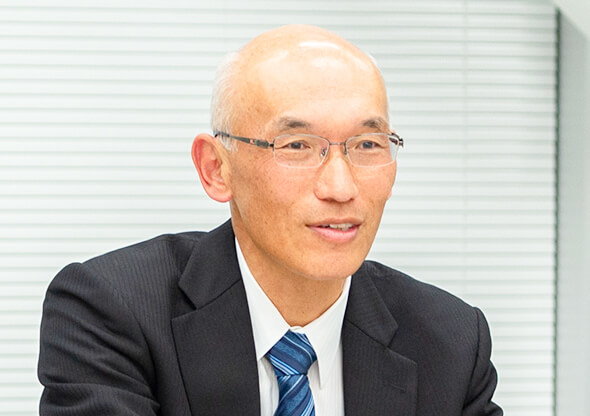
Tsuguhide Isemura, AGC
AGC Inc. (a major glass manufacturer), also, set up the AGC Material Collaborative Research Cluster with the aim of expanding its business domains. Tsuguhide Isemura, Senior Manager of the Collaborative Innovation Group in the Planning Division at the company's Technology General Division, emphasizes the importance of collaborative research with universities. "We are changing our business format to become a manufacturer that develops and provides materials with new value, not just glass. Materials take time, from topic discovery to research and development, commercialization, and social implementation. The power of universities is essential for long-term efforts."
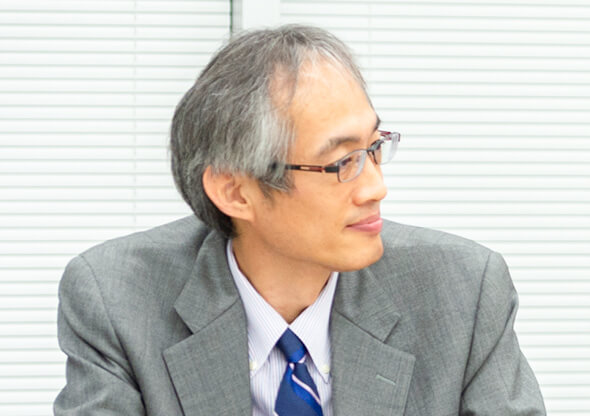
Gaku Sato,Tokyo Electric Power Company Holdings
Tokyo Electric Power Company Holdings, Inc. comes from a completely different background, and needs to conduct multifaceted research. The company has set up the TEPCO Collaborative Research Cluster for Decontamination and Decommissioning (D&D) Frontier Technology Creation to find a way to proceed with decommissioning work at the Fukushima Daiichi Nuclear Power Station accurately and quickly. "The composition and condition of the fuel debris left at the site are unclear. The work of removing unknown substances requires more than just technical knowledge. Tokyo Tech produces abundant research findings in the field of nuclear power and can bring together high-level expertise from science and engineering fields at large. We had to cooperate with Tokyo Tech." (Gaku Sato, Manager of the Regional Partnership Promotion Group, Project Management Office at the company's Fukushima Daiichi D&D Engineering Company)
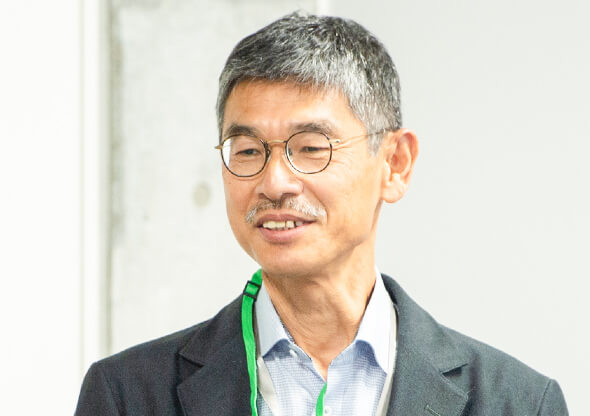
Izumi Nishizawa, KOMATSU
In addition, increasing sophistication means there are many cases where corporate technology development is not enough. A typical example is Komatsu (Komatsu Ltd.), a construction equipment manufacturer that set up the Komatsu Collaborative Research Cluster for Innovative Technologies. Komatsu is jointly researching tribology (phenomena associated with sliding such as lubrication, friction, wear, and seizure) that are essential for improving the performance of construction equipment. The technology is related to the company's core business, and it is an area where it is no longer feasible to improve performance simply by focusing on mechanical technology. Izumi Nishizawa of the Komatsu Collaborative Research Cluster for Innovative Technologies said that conducting research with researchers in machinery, materials, and chemistry produced insights to raise the level of their technological capabilities, such as extending the lifespan of hydraulic pumps.
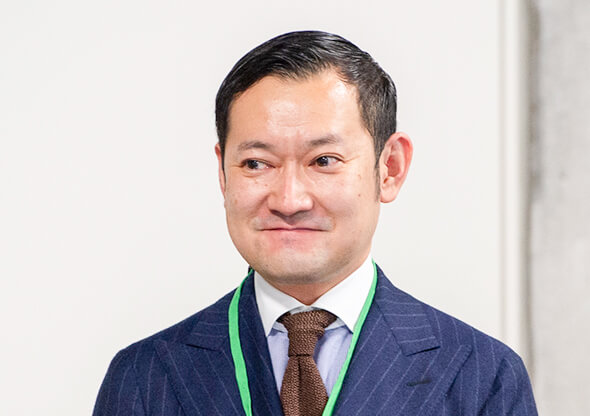
Hiroyuki Mabuchi, aiwell
Tokyo Tech's new industry-academia collaboration framework will also be effective in accelerating adoption of new technology. The startup company aiwell Inc. has set up the aiwell AI Proteomics Collaborative Research Cluster. They launched a business that uses AI to analyze the proteins that make up the human body and provides technologies for improving quality of life. CEO Hiroyuki Mabuchi said "there are surprisingly few opportunities for companies to see the outstanding technology developed at universities and research institutes, hindering their social implementation. Representing Tokyo Tech, we will promote adoption of new technologies in society by presenting them to companies and proposing business models."
A space to learn heterogeneous ideas not found at companies
In order to promote major industrial reforms, it is essential to have people capable of both deepening of knowledge and exploration, allowing them to take on the challenge of research and business creation with new ideas. Expectations are high for the collaborative research clusters in developing such talent.
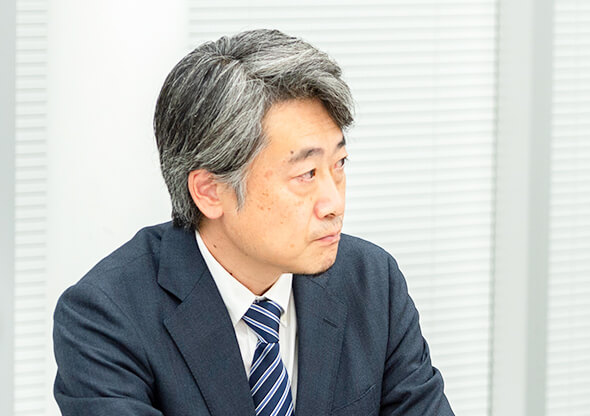
Manabu Miyata, DENSO
Gaku Sato of Tokyo Electric Power Company Holdings touched on the content of Professor Kanade's lecture at the OI School. He said "the importance of sorting out the problem to be solved is something our engineers must keep in mind. In some cases, we stand frozen in front of a big problem without being able to break it down into smaller problems to tackle. Professor Kanade's message made me realize that. I would like to provide such opportunities to our young engineers as well." Manabu Miyata, General Manager of the Tokyo Planning Department at the Tokyo Office of DENSO said he hopes that the OI School and collaborative research cluster will be opportunities for recurrent education to learn insights, values, and methods from different fields that cannot be taught in-house.
In addition, Akiba of Idemitsu Kosan said the following about the clusters' meetup: "It is a space where young researchers can participate and interact with young researchers from other companies, researchers at Tokyo Tech, and venture companies, receiving stimuli that cannot be obtained in-house." It is of course also valuable as place for R&D veterans to be exposed to new ideas and gain opportunities to engage in exploration. But in order to make drastic changes to R&D and the culture of companies, it will be important to involve young researchers who are amenable to absorbing fresh stimuli.
In these times, a system's ability to create innovation is directly linked to corporate competitive strength and, by extension, the country's competitive strength. That is why companies in the industrial world and Tokyo Tech are working hand in hand to drive forward the deepening of knowledge, and combining it with exploration that transcends domains. As a "university town," Tokyo Tech will continue to bring forth innovation and open the way for a new era.
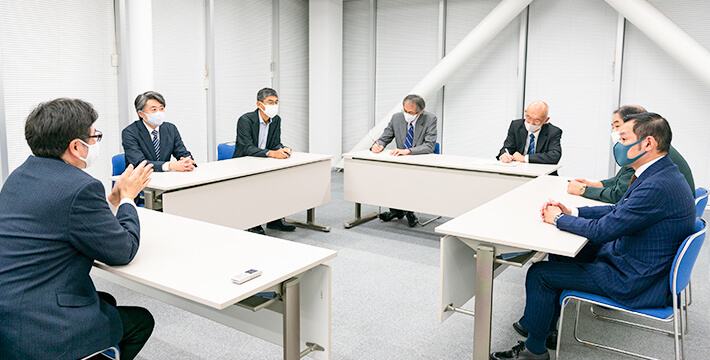
Oshima General CM and representatives of the collaborative research clusters
2nd Tokyo Tech International Open Innovation Symposium 2021

Tokyo Tech will hold the 2nd Tokyo Tech International Open Innovation Symposium 2021 on February 8, 2021. The impact of COVID-19 has severely complicated socio-economic activities such as the movement of goods and people. The pandemic has reconfirmed the importance of information and communication technology (ICT), which supports online communication. Management teams of platforms such as Zoom, Slack, and Box, which provide such technology, will talk about their vision of ICT services in the new normal era to arise after COVID-19. Tokyo Tech's security systems and Project for Overcoming Coronavirus Disasters will also be discussed. Speakers and participants will share their thoughts on how to spark open innovation in situations where economic activity is stagnant. For anyone interested in innovation, the event is free and will be held online.
Date and Time |
February 8, 2021, 13:00 - 18:40 (JST)
(Virtual Exhibition: starting February 1, 13:00 (JST)) |
Venue |
Online |
Admission |
Free |
Registration |
|
The Special Topics component of the Tokyo Tech Website shines a spotlight on recent developments in research and education, achievements of its community members, and special events and news from the Institute.
Past features can be viewed in the Special Topics Gallery.
. Any information published on this site will be valid in relation to Science Tokyo.






















